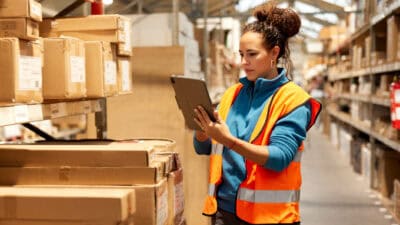Morgan Stanley analyst Brian Nowak has shared some interesting thoughts about the impacts of COVID-19 on the internet. His thoughts and comments could be relevant to e-commerce ASX shares.
Mr Nowak pointed out that the internet played a big part in helping households and businesses alike get through the COVID-19 lockdowns. People turned to online food shopping – my own household did too – streamed entertainment or perhaps played video games.
A big question for him is – are these changes permanent or will the world go back to "old habits and real-world experiences."

Image source: Getty Images
Which ASX shares have seen online shopping booms?
Many businesses have seen an increase in sales and profit thanks to the rapid increase of e-commerce revenue.
There are some e-commerce ASX shares that are purely online and have seen large growth like Temple & Webster Group Ltd (ASX: TPW), Kogan.com Ltd (ASX: KGN) and Redbubble Ltd (ASX: RBL).
However, there's also a larger group of ASX retail shares that have both in-store and online offerings, and the online sales have surged higher. Some examples are: Wesfarmers Ltd (ASX: WES), Adairs Ltd (ASX: ADH), JB Hi-Fi Limited (ASX: JBH), Baby Bunting Group Ltd (ASX: BBN) and Bapcor Ltd (ASX: BAP).
Indeed, the supermarket businesses of Woolworths Group Ltd (ASX: WOW) and Coles Group Ltd (ASX: COL) are also seeing elevated levels of online sales growth.
What is Morgan Stanley expecting to happen?
Mr Nowak said that COVID-19 has changed what people are willing to do. He pointed out that people may have preferred to do the food shopping themselves or try on clothes first before buying them when COVID-19 wasn't around. Morgan Stanley thinks that COVID-19 has brought forward the adoption of e-commerce by three years. He wrote (referring to the US):
Could reopening reverse that trend? We don't believe so. We do expect slower growth in 2021, with consumers eager to spend again on experiences such as travel and restaurants, but the rising trendline for online adoption should continue. We estimate that e-commerce grew by about 40%, or $240 billion, in 2020—three times more than in 2018 and 2019. For 2021, after accounting for the anticipated release of pent-up spending for travel and other live experiences, we expect e-commerce to grow by roughly 9%.
Mr Nowak went on to say that the environment for real estate investment trusts (REITs) and physical stores may never be the same again because of COVID-19 pressures and the adoption of online shopping.
He also commented that last-mile logistics will become increasingly important as customers expect faster delivery of their shopping and food delivery. Mr Nowak commented:
Shared mobility, e-commerce, food apps and grocery delivery leaders have already opened up a significant total addressable market—perhaps as large as $2.6 trillion in offline U.S. consumer spending. Execution and real-time tracking will matter and the platforms with subscription offerings and product bundles could see an advantage in the race to drive retention/frequency.








